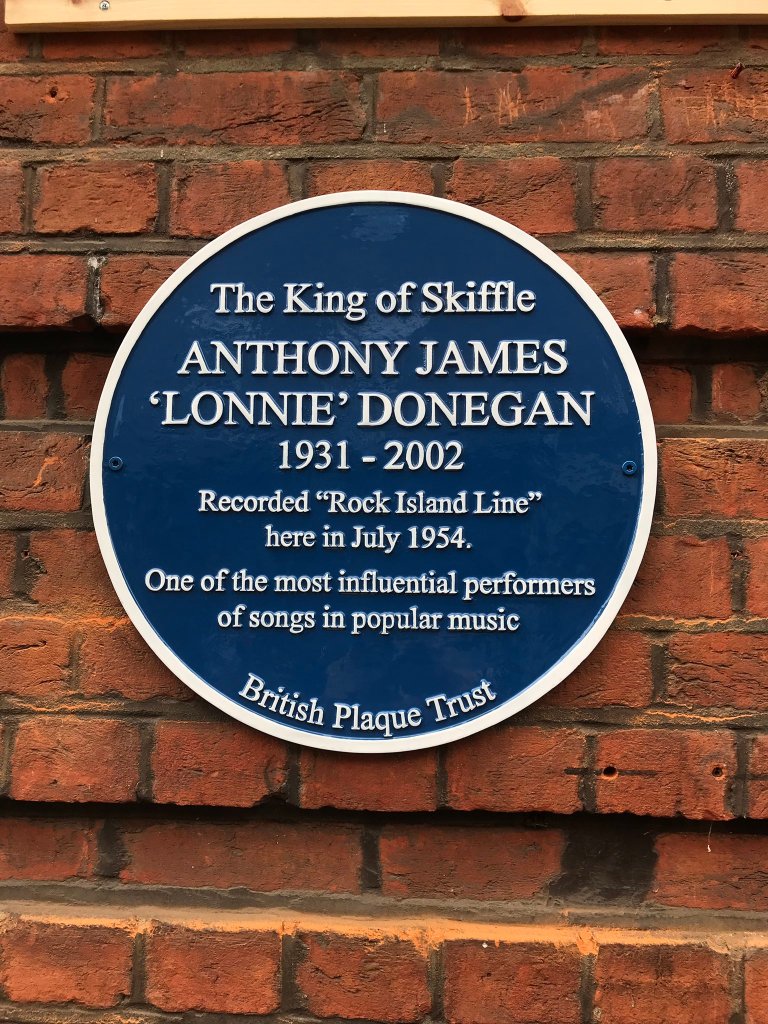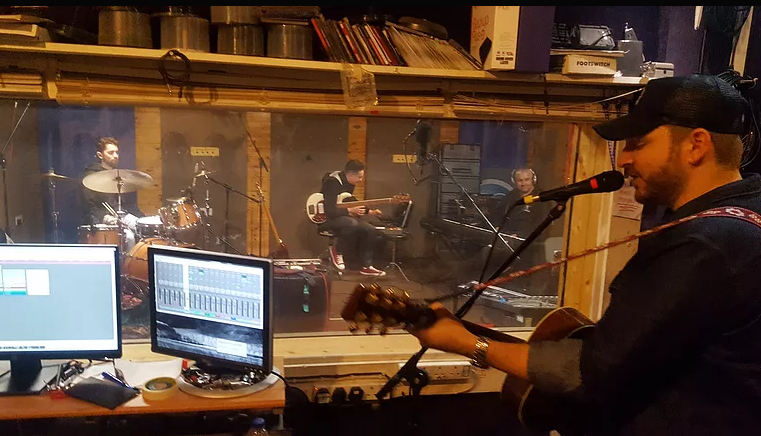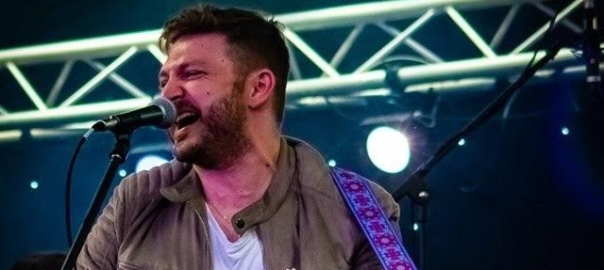In the week of the sixty-seventh anniversary of the recording of Lonnie Donegan’s ‘Rock Island Line’ I talk to Peter Donegan about his father’s legacy, about his viral TV duet with Tom Jones and about his forthcoming album.
DJ: Firstly it’s a huge, huge pleasure to be talking to you. My own dad was a big, big Lonnie Donegan fan and I think he’d be very touched that I was interviewing his son. Growing up in the 1970s the Rolling Stones and Deep Purple and so on were always played a lot in our house but there was still always lots of Lonnie Donegan, too. So it was a big part of my childhood. But if we can start off going back to the very beginning then we’ll look at your more recent career. Elvis Presley recorded ‘That’s Alright’ and your father recorded ‘Rock Island Line’ in the very same month back in July 1954. It’s something Billy Bragg points out in his book on skiffle, and he called them ‘the first tremors of an earthquake that would shake the world’. Did that give you a good feeling seeing it put like that?
PD: Yes, definitely. Billy’s been a huge campaigner for the importance of what has become a kind of forgotten era – the skiffle era. I mean, Billy made another nice analogy which was that it was the nursery for British rock and roll. Because songs like ‘Rock Island Line’ – and that one in particular which changed the British music industry – it gave a new breath of life into what was, you know, a crooners’ market. And I don’t mean any disrespect to any artist up until my dad came out, obviously, but it did. It changed the nature of it. And it made music accessible. It meant that for people like Eric Clapton, for people like Van Morrison, for people like Jimmy Page – all these kind of people realised, ‘Ok, so I don’t have to be – number one – classically trained to play the guitar. I can learn the basic two/three chords – or one sometimes – and the lyrics and go for it.’ And, number two, it meant that you didn’t have to feel self-conscious singing a lot of these old American country and blues songs and feel self-conscious about it – especially a British white person as well. You didn’t feel like you were false either. You could be ‘paying homage’ to, you know, and doing it in your own way. I mean that gave birth to, like the Beatles and the Rolling Stones and Led Zeppelin who all started off in skiffle bands.
DJ: And it was a very British take. It wasn’t a straightforward adoption of an American culture was it?
PD: No, No. You could argue really that while skiffle was Americana music, as we call it now nowadays, it was definitely with a very British tint to it. It didn’t sound the same. They were the same songs, but they weren’t the same way. They were definitely distinct. Which is how ‘Rock Island Line’ went to number 8 in the States, you know – just before Johnny Cash recorded and released it. And the odd thing is, is that my dad had added that part of the tollgate which wasn’t in the Leadbelly original. And then Johnny Cash put out a version afterwards with the tollgate in it again – so you can argue that Johnny was listening to my dad’s version. Because it’s kind of like, he’s just taken dad’s version, slowed it down just a little bit. So there could be something there. There could be something there. You could argue really that the skiffle sessions – all that stuff for that period in time, that six years or whatever it was – was a little bit more British even than when the Stones came out. Because they were doing it much more per original blues… Definitely, much more modernised but it was arguably more towards the original than what Dad was doing.
DJ: In the true folk tradition he actually adapted it and added his own take on it and that’s now become the tradition.
PD: Yes, exactly. You know, it’s been fantastic. And, of course, Dad wrote his own things as well which we all know about. Most notably was the Tom Jones hit ‘I’ll Never Fall In Love Again’. I mean, it wasn’t written for Tom to do. My dad went to release it because he loved the sounds that he was hearing coming from Ray Charles. Great gospel R&B singer, you know, and Dad thought, ‘That’s brilliant. I want to do something like that.’ Wrote ‘Never Fall In Love Again’ and the record label which was Pye at the time – who were trying to be true to their roots and wanting to be jazz, despite the fact of having Lonnie Donegan on the record label who was definitely not jazz anymore despite his origins of coming through with the Ken Colyer Jazzmen and then the Chris Barber Jazz Band – they insisted on there being a jazz version. So they recorded a jazz version and a more gospel version which Dad wanted to do. And insisted on releasing the jazz version – obviously, because that was their plan all along. And nothing happened with it – because it wasn’t what people expected. It wasn’t ‘Dad’ if you know what I mean. So, Tom picked up on it.
DJ: It was a few years gap wasn’t it between your dad releasing it and Tom Jones having a hit with it?
PD: It was early ‘60s for my dad. You’re looking at 62/63 whenever it was – and I think it was 67/68 when Tom released it. And Dad’s gag on stage was always, ‘What’s Tom Jones got that I haven’t got!’ It was always a good laugh. And then, of course, Elvis picked it up in the end because, you know, Elvis was permanently ‘on tour’ doing all the casinos in Vegas. As was Tom, so they were always going to see each other’s set at some point in time. And Elvis picked it up and did it, you know. And I think that was the last track on the last album that Elvis released.
DJ: And then, obviously, you had that wonderful emotional moment with Tom Jones on ‘The Voice’ two years ago. That must have been very, very special?
PD: It was! It was a big ‘pinch me’ moment because I was scouted by the show. They’d seen me at a country festival in London and they wanted that – because they knew that the country genre was really booming in the UK. And they wanted me to go and try out – so that was nice. And they said, ‘Don’t worry. It’s not like you’ve got to wait in the queue or anything. You can go straight to the producer so there’s no pressure.’ And that’s more pressure I think! So yeah.. sat there and did some original songs. That’s what they wanted. They said they wanted originals. And went through about another four rounds of auditions and they said, ‘Yep – we want you for the blinds.’ And I just thought well, if nothing else, this is just a bit of PR. You know, get a nice bit of high-quality PR footage [laughs] and have some fun while you’re there. And when it was Tom that turned, you know, it was an emotional relief that somebody turned. I was very nervous. I’d never done anything like that before and it was a very nice moment. And then when, obviously, Tom asked us to do that song and we did it – it was a shock, you know. There’s a video about me – because I did a video on YouTube talking about it which had about two million views.
DJ: Yes, I watched that. I still tear up every time I see the footage. It’s just so incredible!
PD: It was a lovely, lovely evening. It really was. I mean, bittersweet in some ways because obviously you realise it’s a TV show first and foremost before it’s a talent show – and it’s a very good one and I really enjoyed my experience on there. But, as a friend of mine who was there said, ‘That’s going to go viral.’ I said, ‘Do you think? Shit!’ He said, ‘Why?’. I said, ‘I peaked too soon in that case! It probably means I’m out next.’ And I was out next!
DJ: But no-one could take away that moment though.
PD: No! I have no regrets. I had great fun. And not many people get to do three songs in two shows – so it was good!
DJ: Has Tom been in touch since?
PD: No. I’ve tried but not got anything back though.
DJ: Ok. Ok. And just looking back – this week, it’s actually the 67th anniversary of ‘Rock Island Line’ being recorded.
PD: Yep. ‘54 it was recorded. ‘56 it became a hit. It was a track on the Chris Barber Jazz Band album and for whatever reason Decca released it two years later as a single and it was played on – I can’t remember the radio show – Dad didn’t know anything of it. Somebody said to him, ‘You know you’re number one!. He was like, ‘What?’ ‘Yeah check out the papers…’ And the rest is history, as they say.
DJ: And you did a special concert two years ago, to mark the 65th anniversary of it?
PD: We did, yes. We did one in 2018 just at the end because it all started off with Chas Hodges – God rest his soul. It was his initial idea because we were raising money for our son’s therapy for his autism and he said, ‘If you want to do a gig, me and Dave will get up and do something. We’ll do half an hour, you finish the gig off. I was like, well that’s lovely. Mentioned it to a couple of friends as I was talking and they we’re like, well I’ll do something and I’ll do something and someone said, ‘Well we haven’t done a night for your dad in a while. Why don’t we do that?’ So in 2018 we had Billy Bragg, Nora Guthrie, The Jive Aces, Mike Berry, Mike Read, Ralph McTell, Chris Difford from Squeeze, Chas McDevitt, Vince Eager and we did that at the Union Chapel in Islington. And Billy Bragg said, ‘Right, so what are we doing next year?’ And I was like, oh you’re kidding right. But I’d invited Van to do that one and he wasn’t available but then he followed up and said, ‘Are you doing another one?’ I said, ‘Well yes, next year’s the 65th anniversary of the recording of ‘Rock Island Line’. And then Mike Read said, ‘Well we need a blue plaque to commemorate that.’ So we did a blue plaque on the same day, on the morning and then we went and did the gig.

DJ: You obviously grew up with music. Did you always want to be a musician?
Yeah. I did. There was never any other option, you know. And I had a great coach, obviously, in Dad and he always taught me that the best thing to do – the only way to make it in this industry is to write your own songs. And that’s why I’ve always done that. From becoming my dad’s piano player to then becoming the opening act for the set, I always did original material. And then, from then I kept doing it. It was difficult because, you know, every time a label said that we could do an album they would only include a maximum of one of my songs on it. Because they wanted to make easy money and just do another Lonnie Donegan tribute album which was, you know, getting frustrating to say the least. So, I decided to go independent and in 2017 released my ‘Superman’ EP which did quite well for my first independent thing and that’s what got me ‘Country To Country Festival’ which got me noted by the guys at ‘The Voice’ and then on with Tom Jones and then on from there. And then we did the live album after that which was recorded in 2019 in the Decca recording studios. In the same studio that Dad recorded ‘Rock Island Line’ – which now belongs to the English National Opera. But that was nice. It was good fun. And then since then I’ve released ‘Thank You Texas’ which was co-written with two Texans at the Buddy Holly song-writing retreat in Lubbock.
DJ: And that won an award didn’t it?
PD: It yes – at the ‘Texas Sounds Country Music Awards’ last year. Got Best Male Vocalist and Original Song.

DJ: The Americana/country direction that you’ve taken as you wanted to pursue your own, as you say, independent career – was that a very conscious decision or did you just sort of evolve into that direction, musically?
PD: Well, obviously, when you consider the influences I was surrounded by with Dad’s record collection at home – which had everything, you know, from Fats Waller to Jerry Lee Lewis, Johnny Cash, Willie Nelson, The Highway Men – all that kind of stuff. So I grew up with that plus – I was born in London but only because Dad was doing a West End thing at the time… We were living in California. So you know California, Florida, Spain. I didn’t grow up here, so I was surrounded by American music a lot of the time. And Dad was big into country. And then so was I. I’m a huge Waylon fan, Willie fan and later on, you know, I love now Chris Stapleton and Eric Church and the High Women if you’ve heard them… So it was a natural transition for me because I like to write stories, you know real-life events, that kind of stuff. And country music, Americana music in general really lends itself to that.
DJ: Well story telling is at the heart of those lyrics.
PD: Yeah. So it was a natural transition for me. And when you consider really where I came from musically with Dad, skiffle is what we call Americana now. Because Americana is country, with blues, folk. And it’s just Americana is the umbrella term. And underneath it you’ve got all these different genres.
DJ: So what’s next for you in terms of your solo career? Are you working on new music at the moment?
PD: I am yes. Again, written at the same retreat with a couple of great song-writers in America. With Sean Healen who’s from New Mexico and with Tessy Lou Williams – ‘It’s My Dreams’. We did a lockdown sessions version of it which you can find on YouTube but there will be a single version of it coming out. And it will be included on the new album which is currently being made.
There’ll be a couple more singles to come off that album as well… I think there’s some really cool tunes on there, especially with the new collaborations. Because I do like to co-write… the old adage two heads are better than one is true. Because there’s ideas that you come up with that you wouldn’t come up with unless you were sitting with somebody else. I’m not saying that maybe their idea is in the song, but they say something which sparks an idea in your head again, you know – and the other way around, too.
DJ: That approach to collaboration is very much part of the Americana scene isn’t it, I think?
PD: It is and there’s a feelgood sense within it as well. It’s a case of not quite as much competition as we’re in it together. So it’s more fun to drag these other people that you respect – if you’re not already friends – along with you and have that shared experience rather than try and keep it for yourself. And I like that feel. It’s much more relaxed… It’s a better experience. It’s less uptight.
Thank you so very much to Peter Donegan for talking to me. You can check his forthcoming live dates on his website here:
Related posts:
Visit to the birthplace of British rock ‘n’ roll – the 2i’s coffee bar, Soho
Book review: ‘Roots, Radicals & Rockers – How Skiffle Changed the World’ by Billy Bragg

Nice article. Thanks you
LikeLiked by 2 people
Thanks for that – it was great chatting to him.
LikeLiked by 1 person